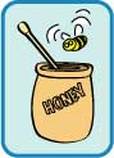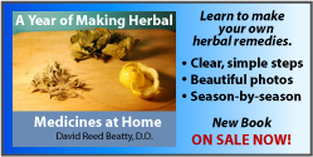Honey as MedicineHoney! How sweet it is! And one of the oldest natural medicines. ~~~Author: Karla Beatty
|
|
|
10 Healthy Uses for Honey

Raw honey just may be one of the most effective home remedies when you think of Food as Medicine. Alternative health practitioners consider honey as on of nature’s best all-around remedies. Raw honey is known to have potent anti-bacterial properties. Honey is produced or collected in most regions of the world. Medicinally honey is eaten straight, mixed with water or tea, or even applied topically. What kinds of health issues can honey benefit?
10. Infections
Honey has powerful antibacterial properties. It has the potential to kill viruses and bacterial infections. It is often used on infected wounds, but also may have good effects on eczema, ringworm, and other types of skin infections. With acne, honey helps to destroy the bacteria and helps prevent scarring to the skin. It is sometimes used topically for vaginal yeast infections. Honey may also have some anti-fungal properties for athlete’s foot. 9. Heart Health
Will honey prevent a heart attack? Probably not. But honey is high in polyphenols, powerful antioxidants that are thought to reduce heart disease and some types of cancer. Polyphenols are also found in fruits, vegetables, green tea and other cancer-fighting foods. And honey may have a beneficial effect by improving blood flow. This can help prevent damage to capillaries. Mixing honey with fresh garlic juice can assist in controlling blood pressure. All of which benefit heart health. 8. Arthritis
Honey mixed with cinnamon may be good for arthritis pain. A study at Copenhagen University used one tablespoon of honey with half a teaspoon of cinnamon powder. This can be mixed into hot water and drunk daily before breakfast. Arthritis patients reported reduced pain and increased movement. 7. Digestion
A spoonful of sweet honey is soothing to the stomach. This may help generalized stomach ache or minor upset stomach. Studies in India report honey as beneficial to relieving gas. Other studies focus on using honey to relieve indigestion due to heavy meals, on acid reflux, and on relieving ulcers. Honey has natural enzymes that may improve digestion. 6. Immune System
Honey has antibacterial and antioxidant properties. These can help strengthen the immune system, thus boosting the body’s natural ability to face bacterial and viral attacks. 5. Sore Throats, Colds, Cough, Sinus
One of the most traditional uses of honey is to treat sore throats due to colds. When the throat feels raspy or has a tickle, swallow a tablespoonful of raw lukewarm honey. This can also be effective as a cough syrup and may even help to clear the sinuses. 4. Fatigue
Honey includes invert sugars of glucose and fructose that can give an instant energy boost when eaten. This reduces fatigue and stimulates mental alertness. Some sugars can give a quick boost followed by a crash of low blood sugar, but the sugar boost from honey seems to be less likely to cause a crash. 3. Cholesterol
Honey mixed with cinnamon can have a beneficial effect on cholesterol. Honey may assist in lowering LDL cholesterol. More studies need to done in this area. 2. Bladder Infection
Honey is known to have powerful anti-bacterial properties, effective on many species of bacteria. Taken internally, honey kills viruses and bacterial infections. It may be most effective for bladder infections when mixed and eaten with raw, minced garlic. 1. Burns and Wounds
Although honey is an ancient remedy, today many health and medical practitioners use honey to treat burns and wounds. In treating burns, honey may:
|
|
|
Honey can be bought in several forms. The best choice is raw honey that has not been heated or pasteurized. Honey in jars may appear to be lighter or darker. Choose the darker as it may have greater antibacterial and antioxidant potential. Honey may have undertones of flavor based on the flowers or plants the bees have been feeding at. Some people consider that the remnants of the pollen and plants in honey eaten before and during allergy season may help ease pollen allergies.
Important Note: Raw honey SHOULD NOT be given to infants under the age of 18 months, and is not recommended for the very elderly or others with compromised immune systems. Did you enjoy this SimpleTens article on the medicinal uses of honey? You might enjoy the article about Foods that Fight Cancer. Read more articles about Food as Medicine. |
CommentsHave a response about this article on Honey as Medicine? Add a comment to the discussion.
Posted 3/27/14
What’s wrong with giving honey to babies? I thought honey is in some baby foods and it's good and nutritious? —QwellQ12 Response 3/29/14 Raw honey has a potential for small traces of botulism in it. Babies have not yet developed the immune system protections against botulism bacterias. Honey that is in prepared foods, such as baby foods, is cooked and not a problem. —OSN (O, Sweet Nature) |
DISCLAIMER The content on SimpleTens is for educational purposes only and designed to support minor health issues, not to replace medical or psychiatric treatment. If you are concerned about a health issue, please see a health professional. Please read the full Disclaimer.




